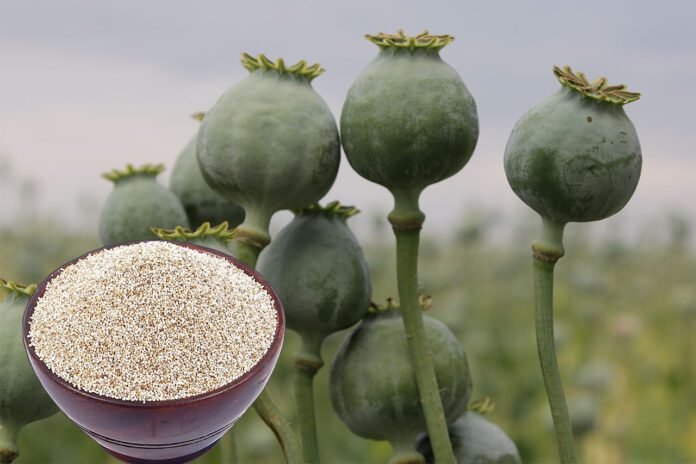Health Benefits of Poppy Seeds
Unlock the hidden health benefits of poppy seeds: boost energy, sleep better and more! Poppy seed have long been lauded for their culinary uses, but did you know they also hold hidden health benefits? In this article, we’ll dive into the fascinating world of poppy seed and uncover the remarkable ways they can boost your energy levels, improve your sleep, and contribute to overall well-being.
Introduction of poppy seeds
Poppy seed, derived from the poppy plant, are tiny, nutty-flavored wonders that have been a staple ingredient in a variety of cuisines for centuries. Their unique texture and delicate flavor make them a versatile ingredient in both sweet and savory dishes.
Nutritional benefits of poppy seeds 👈 click this video link

1. Essential Fatty Acids:
Poppy seed provide a rich supply of beneficial fats, including omega-3 and omega-6 fatty acids. These fats are crucial for promoting heart well-being, supporting cognitive function, and diminishing inflammation within the body.
2. Dietary Fiber:
Fiber is essential for digestive health, and poppy seeds contain substantial amounts of dietary fiber. Dietary fiber encourages consistent digestion, guards against constipation, and aids in maintaining a balanced gut microbiome.
3. Protein:
Poppy seed provide a moderate amount of protein, which is important for tissue repair, muscle development and overall body function. Including poppy seed in your diet can contribute to meeting your daily protein needs. Poppy seeds are a decent source of protein. A typical 100-gram poppy seed contains about 17-19% of the recommended daily value for protein.
4. Vitamins:
Poppy seeds contain a variety of vitamins, including B-complex vitamins (such as thiamin, riboflavin, niacin, and folate) that are essential for energy metabolism, cell growth, and maintaining healthy skin.Here is an estimate of the percentage of recommended daily values for the various vitamins found in poppy seeds
Vitamin B1 (Thiamine): About 8-10% of the recommended daily value.
Vitamin B3 (niacin): About 8-10% of the recommended daily value.
Vitamin B6 (Pyridoxine): About 6-8% of the recommended daily value.
Folate (vitamin B9): About 10-12% of the recommended daily value.
Vitamin E: About 8-10% of the recommended daily value.
Note that these percentages are rough estimates and may vary based on factors such as seed variety, processing, and individual nutrient needs. Additionally, poppy seeds are often used in small amounts in foods, so the actual nutrient content may be lower than the stated percentages.
5. Minerals:
These seeds are rich in minerals like calcium, magnesium, phosphorus and iron. Calcium and magnesium support bone health, while iron is crucial for transporting oxygen in the blood and preventing anemia.
6. Antioxidants:
Poppy seed contain antioxidants such as polyphenols and flavonoids, which help protect cells from oxidative stress and reduce the risk of chronic diseases.
7. Plant compounds:
Poppy seed contain natural compounds such as linoleic acid, oleic acid and phytosterols, which have potential health benefits, including lowering cholesterol levels and supporting heart health.
8. Nutrient Density:
Despite their small size, poppy seeds are nutrient-dense, meaning they provide essential nutrients in a concentrated amount in a small serving.
9. Calorie Content:
Poppy seed are calorie-dense due to their fatty content. Although they should be eaten in moderation, their nutrient-rich nature makes them a valuable addition to a balanced diet.
Including poppy seeds in your diet can help you reap the nutritional benefits they offer. They can be sprinkled on salads, added to smoothies, mixed with yogurt or used as crunchy toppings for various dishes. However, portion sizes are important to keep in mind, as their calorie density can add up quickly. Including a variety of nutrient-dense foods in your diet, including poppy seed, contributes to overall health and well-being.
Health benefits of poppy seeds
1. Increases energy and vitality:
Poppy seed are a natural source of energy-boosting nutrients like healthy fats, proteins and carbohydrates. These nutrients provide a sustained release of energy, helping to combat fatigue and keep you alert throughout the day.
2. Improving sleep quality:

Poppy seeds contain compounds like tryptophan that may contribute to better sleep. Tryptophan is a precursor to serotonin and melatonin, neurotransmitters that regulate sleep and mood. Consuming poppy seed can help improve sleep quality and promote a restful night.
3. Supports Digestive Health:
The dietary fiber present in poppy seed supports digestive health by promoting regular bowel movements and preventing constipation. Fiber also acts as a prebiotic, nourishing beneficial gut bacteria and contributing to a healthy gut microbiome.
4. Promotes Heart Health:
Poppy seed are rich in heart-healthy nutrients like magnesium, which helps regulate blood pressure and maintain proper heart rhythm. The presence of healthy fats, such as omega-3 and omega-6 fatty acids, further supports cardiovascular health by reducing inflammation and improving lipid profiles.
5. Providing essential nutrients:
Poppy seeds provide a range of essential nutrients including calcium, phosphorus and iron. These minerals play important roles in bone health, blood circulation and oxygen transport respectively.
6. Antioxidant Protection:
Antioxidants found in poppy seeds, such as polyphenols and flavonoids, help protect cells from oxidative damage caused by free radicals. Antioxidants help reduce the risk of chronic disease and support overall wellness.
7. Nutritional Diversity:
Including poppy seed in your diet diversify your nutritional intake, so you get a variety of vitamins, minerals and beneficial compounds that contribute to optimal health.
8. Versatility in Cooking:
Poppy seeds can be incorporated into a variety of foods, making it easy to incorporate into your diet. From salads to baked goods, their versatility allows you to enjoy their health benefits in a variety of ways.
9. Possible Natural Remedies:
Traditional medicinal systems have recognized poppy seed for their potential to relieve minor discomforts such as headaches and aid in relaxation due to their natural healing properties.
Remember, while poppy seed provide these health benefits, moderation is key. Include them as part of a balanced diet and consult a healthcare professional if you have specific health concerns or dietary restrictions. By including poppy seeds in your diet, you can harness their health-enhancing potential and boost your overall well-being.
Including poppy seed in your diet

1. Breakfast Boost:
Sprinkle poppy seeds into your morning bowl of oatmeal, yogurt or cereal. Their nutty flavor adds a delightful crunch and boosts the nutritional value of your breakfast.
2. Baked goods:
Add a twist to your baked goods by adding poppy seeds to muffins, pancakes, waffles or bread. They not only contribute to flavor but also provide texture and nutrition.
3. Salads and Dressings:
Toss poppy seed into your salad for an extra layer of flavor and a delightful crunch. You can mix them into homemade salad dressings to add a unique twist.
4. Smoothie Supercharge:
Mix poppy seeds into your favorite smoothie for a nutritional boost. They can provide an additional source of protein, healthy fats and dietary fiber in your refreshments.
5. Toppings and Garnishes:
Use poppy seed as a topping for dishes like soups, stews and casseroles. They can improve both the visual appeal and nutritional content of your food.
6. Nutritious Snacks:
Sprinkle poppy seed over popcorn, toasted nuts, or even chopped fruit for a satisfying and nutritious snack.
7. Homemade Granola Bars:
Make your own granola bars or energy bites with poppy seeds as one of the ingredients. These portable snacks are perfect for on-the-go nutrition.
8. Asian-Inspired Food:
Explore Asian cuisine by adding poppy seed to stir-fries, rice dishes or noodle bowls for an unexpected twist.
9. Dip and Spread:
Add poppy seeds to hummus, guacamole or other spreads for a unique flavor profile that will impress.
10. Dessert Delights:
From cakes and cookies to pastries and puddings, poppy seeds can be used to create a range of delicious desserts that excite your taste buds.
11. Homemade Sauce:
Mix poppy seed into homemade sauces, such as barbecue sauce or marinades, to enhance their texture and flavor.
12. Nut Butter Mixture:
Combine poppy seed with your favorite nut butter for a healthy and satisfying spread to enjoy with fruit or whole grain toast.
13. Cooking Enhancers:
Use poppy seeds as a seasoning for roasted vegetables, adding both flavor and nutritional value to your savory dishes.
By experimenting with these creative ways to incorporate poppy seeds into your diet, you can enjoy their nutritional benefits while adding a delightful twist to your meals and snacks. Be mindful of portion sizes, as poppy seed are calorie-dense, and moderation is key to maintaining a balanced and healthy diet.
Possible warnings and side effects

1. Allergies:
Some people may be allergic to poppy seeds. Allergic reactions can manifest as more serious symptoms such as skin rash, itching or difficulty breathing. If you have a known seed or nut allergy, use caution when trying poppy seed for the first time.
2. Opiate Testing:
Poppy seeds come from the same plant family as the opium poppy. Consuming large amounts of poppy seed can result in a drug test showing traces of opium. This can have implications, especially in occupations that require drug testing.
3. Interactions with drugs:
Poppy seeds contain compounds that may interact with certain medications. If you take prescription medications, consult your healthcare provider before significantly increasing your poppy seed consumption.
4. Pregnancy and lactation:
Pregnant and breastfeeding people should exercise caution when consuming poppy seeds. Although they may provide nutritional benefits, it is recommended to consult a healthcare professional to ensure their safe use during this period.
5. Digestive sensitivity:
Poppy seeds are rich in dietary fiber, which can cause digestive discomfort in some individuals, especially when consumed in large amounts. Start with small portions to gauge your tolerance.
6. Calorie Density:
Because of their healthy fat content, poppy seeds are calorie-dense. Although they provide valuable nutrients, excessive consumption can lead to excess calorie intake, potentially affecting weight management goals.
7. Blood thinning properties:
Poppy seeds contain compounds that may have mild blood-thinning effects. If you are taking blood thinners or have a bleeding disorder, it is recommended to consult a healthcare provider before including poppy seed in your diet.
8. Child Safety:
Due to the possibility of finding opium in poppy seeds, it is recommended to avoid giving it to young children or infants, as their developing bodies may be more sensitive to these substances.
9. Moderation is key:
As with any diet, moderation is key. While poppy seed provide health benefits, consuming excessive amounts may cause unwanted effects or interactions.
10. Individual variability:
Individual reactions to poppy seed may vary. Some people tolerate them well, while others may experience adverse effects. Being mindful of how your body reacts and adapting your intake accordingly is of significant importance.
It is important to note that most people can enjoy poppy seed as part of a balanced diet without experiencing any adverse effects. However, if you have specific health concerns, allergies or are taking medications, it is always wise to consult a healthcare professional before making significant changes to your diet. Being informed and aware will help you enjoy the benefits of poppy seeds and minimize any potential risks.
Exploring poppy seed beauty remedies
1. Exfoliating Scrub:
Poppy seed are an excellent natural exfoliant due to their slightly abrasive texture. When paired with scrubs, they help gently remove dead skin cells, unclog pores and promote a smoother complexion. Mix poppy seeds with a carrier oil (such as coconut or jojoba oil) and a natural exfoliating base (such as sugar or oatmeal) to create an effective scrub.
2. Skin Brightening Mask:
Poppy seed based face mask can help brighten and rejuvenate the skin. Combine poppy seed with yogurt, honey or other nourishing ingredients to create a mask that gives a healthy glow and removes dullness.
3. Hair Detox and Scalp Massage:
Poppy seeds can be used as part of a scalp massage to improve blood circulation and improve hair health. Mix poppy seed with a carrier oil and massage gently into the scalp. It can help remove buildup, promote hair growth, and contribute to a healthy scalp.
4. Lip Scrub:
For soft and smooth lips, consider making a lip scrub using poppy seeds. Combine poppy seed with honey and a small amount of sugar to create a natural lip exfoliator that helps remove dry, flaky skin.
5. Treatment of hands and feet:
Include poppy seed in homemade hand and foot scrubs for softer and more supple skin. The exfoliating properties of poppy seeds help slough off dead skin cells, rejuvenating your hands and feet.
6. Natural Cleanser:
Poppy seed can be used as a gentle cleanser to remove dirt and impurities from the skin. Mix them with a cleansing oil to create a natural and nourishing cleanser that won’t strip your skin of its natural oils.
7. Moisturizing Body Oil:
Infuse poppy seeds in a carrier oil (such as almond, grapeseed, or olive oil) to create a moisturizing body oil. These oils can be applied to damp skin after showering to lock in moisture and leave your skin feeling soft and hydrated.
8. Nail and Cuticle Care:
Create a homemade nail and cuticle treatment by combining poppy seeds with coconut oil. Gently massage the mixture into your nails and cuticles to promote healthy nail growth and prevent dryness.
9. Warnings and Patch Tests:
Before using any poppy seed beauty remedy, it’s important to do a patch test on a small area of skin to ensure you don’t have any adverse reactions or allergies. Additionally, be careful when using poppy seeds on sensitive skin areas.
10. Mindfully include:
Although poppy seed beauty remedies can offer benefits, they should be part of a well-rounded skin care routine that includes proper cleansing, moisturizing, and sun protection.
By exploring these poppy seed beauty remedies, you can tap into the natural potential of these seeds to enhance your skin and hair care routine. As with any skincare regimen, consistency and mindful application are key to achieving desired results.
Conclusion
In conclusion, poppy seeds are an extraordinary treasure trove of health-enhancing properties, contributing to various aspects of well-being, from increasing your energy to improving sleep. By incorporating them into your daily routine, you can unlock their secret benefits and embark on a journey to a healthier, more vibrant life.
The Healthy Side of Chocolate: Surprising Benefits You Never Knew

